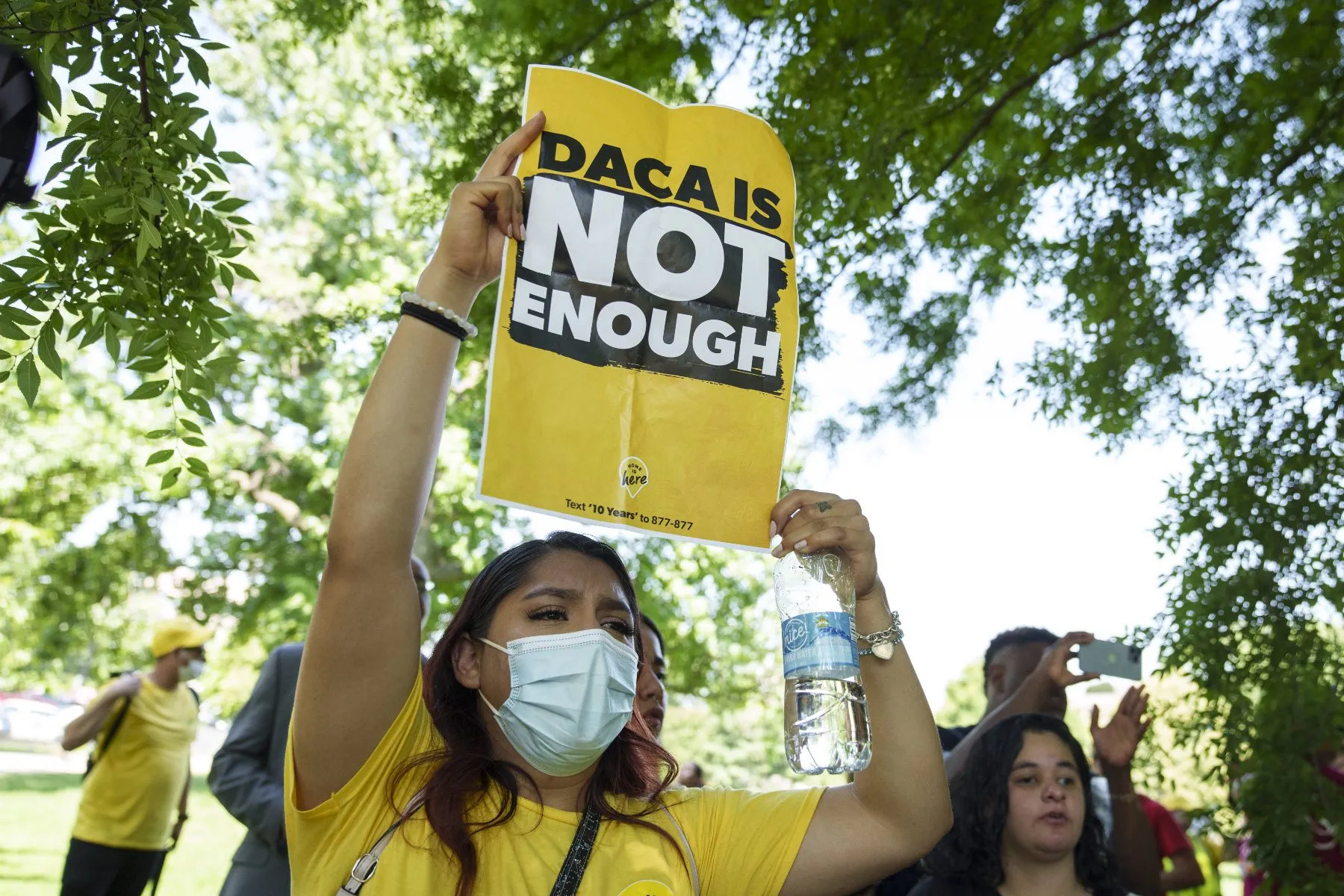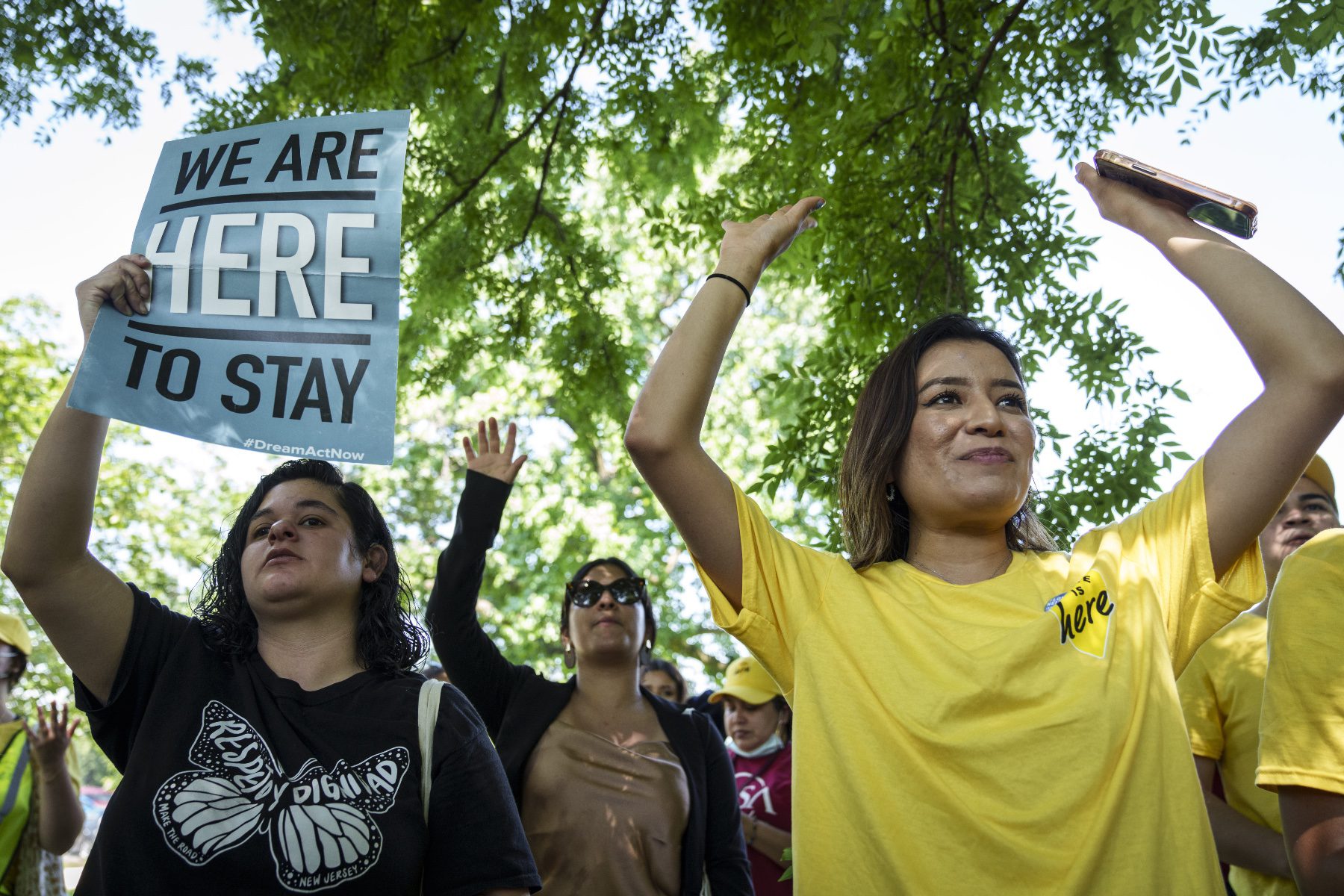On Wednesday, the nation’s 600,000 Dreamers received mixed news about the Deferred Action for Childhood Arrivals Program (DACA): The Fifth Circuit Court of Appeals upheld a Texas judge’s ruling that the program was implemented unlawfully but will maintain the program for current DACA recipients. Women represent over half of DACA recipients, and research indicates that women are the Dreamers most likely to attend college, a choice that would be off limits to many of them without the benefits of the program.
Started by former President Barack Obama in 2012, DACA allows undocumented people brought to the United States as children to live, work and study in the country without the threat of deportation if they meet certain criteria. These individuals are called Dreamers because of The DREAM Act, an unsuccessful 2001 bill that would have given them legal status. DACA has withstood multiple legal challenges since its launch, including former President Donald Trump attempting to end it, a move the Supreme Court blocked in 2020. But policy experts say the current threat to the program is the most serious to date.
In fact, the federal government has frozen all new DACA applications since July 2021, when U.S. District Judge Andrew Hanen of Texas ruled that the Obama administration started the program illegally. That pause on new applicants remains in place after the Fifth Circuit Court of Appeals’ decision to affirm the Texas ruling on DACA, which celebrated its 10th anniversary in June. The latest ruling was not unexpected by the Biden administration, which moved to codify DACA in August “by finalizing a rule that will reinforce protections, like work authorization, that allow Dreamers to live more freely,” President Biden said in a statement then. Judge Hanen must now review the rule, slated to take effect October 31.
If DACA remains closed off to new applicants or ultimately ends, there will be direct consequences for education, including for students and teachers. The education profession, overwhelmingly made up of women, is one of the top careers DACA recipients pursue. Already in the midst of a teaching shortage, the education field stands to lose 800 DACA-protected professionals per month for two years should the program be dismantled.
The 19th spoke with Jessie Hernández-Reyes, policy analyst for higher education for the Education Trust, a national educational equity nonprofit, about how threats to DACA have affected students and families. She also discussed the advantages of the program and the avenues available to states, lawmakers and institutions to continue serving the undocumented population if DACA is struck down.
This interview has been edited for length and clarity.
Nadra Nittle: The Fifth Circuit Court of Appeals has affirmed the Texas judge’s ruling that DACA was implemented unlawfully. What are your thoughts about the decision?
Jessie Hernández-Reyes: Yesterday’s decision by the Fifth Circuit Court of Appeals is alarming and has harmful future implications for current and future undocumented students and undocumented students in higher education. The Court of Appeals has sent the case back down to the Texas District Court to determine the lawfulness of the Biden’s Administration’s new rule on DACA, meaning that DACA is still in jeopardy of being struck down. Despite the overwhelming positive impact of this program, DACA continues to face uncertainty in the courts. Congress can permanently protect DACA recipients and expand the benefits of DACA to those not currently eligible for the program by providing the undocumented community a pathway to citizenship or expanding [or] reopening DACA.
A lot of folks in the higher ed space, and, also, just broadly in the undocumented student space, should be nervous about what’s happening. There have been a series of legal challenges to DACA since its inception. But if we go back a little bit in time to July of 2021 … when the [Texas] ruling happened, 80,000 applications were put on hold, so they have not been processed since then. Overall, this is nerve-racking for folks.
What benefits do DACA recipients in college have that other undocumented students do not?
More than 427,000 undocumented individuals are enrolled in higher education, so one out of 50 students in higher ed is undocumented. However, from that larger group, less than half of the undocumented student population in higher ed is eligible or currently covered under DACA. I also want to highlight that this is a racial equity issue, since students of color overwhelmingly make up the population of undocumented students in higher ed. Forty-nine percent of them are Latino. Twenty-four percent are Asian American or [of] Pacific Islander background, and then 13 percent of them identify as Black.
Right now, students that are covered under DACA are able to reap some of the benefits. For example, because DACA provides them work authorization, they have the ability to actually work as opposed to their undocumented student peers who don’t have access to DACA. DACA recipients are able to work on campus or work off campus because of this work authorization.
There [are] seven U.S. states where only DACA recipients can access in-state tuition and state financial aid. But if they weren’t covered under DACA, they wouldn’t be able to receive those benefits. One of those seven states is Massachusetts. If these students didn’t have DACA and had to pay out-of-state tuition, they would be paying three times the cost of tuition. By being able to access in-state tuition and state financial aid, they’re able to afford college a bit more. And, by association, they’re able to benefit from the economic and social mobility that comes from a college education.
College enrollment has declined during the pandemic, and ending DACA may result in even more students not attending college. What are your thoughts about that?
Undocumented students, including DACA recipients, are not eligible for federal financial aid under the Higher Education Act. That means they’re not eligible for federal student loans, work study or grants. So that already affects college affordability for them. And, again, depending on which state they’re in, they may or may not have access to in-state tuition or state financial aid. So these students are already facing barriers and challenges to affording college in the first place. I definitely do think institutions are missing out on this student population because if these students can’t afford it, they will likely not enroll, and there’s no vehicle for them to really take out loans. Either they’d have to resort to private loans or just take on this debt, which is not something that most students will do, especially if they have added responsibilities at home. There was a proposal to actually expand federal financial aid to DACA recipients. It didn’t end up going through, but that’s something else that could be done to address college affordability for undocumented individuals at large.

According to pro-immigration lobbying group FWD.us, if DACA ends, the teaching profession will be disproportionately affected, with losses of 800 teachers each month for two years. Can you discuss that?
It is troubling that 800 teachers with DACA per month for the next two years would be ousted from their jobs if DACA ends, given that there are already restrictions in many states on undocumented individuals obtaining a teaching license. In states where undocumented individuals are allowed to obtain teaching licenses, some states only allow for DACA recipients to obtain teaching licenses, among other professional/commercial licenses. The end of DACA would remove the possibility of current and future undocumented students in higher education to pursue teaching as a profession, which is sorely needed considering the current teaching shortage the country faces, and the importance of having a teacher workforce that is representative of [the] students in this country, where 98,000 undocumented students graduate from U.S. high schools every year.
What recourse is available to states or lawmakers who want to support undocumented people with or without DACA?
States that limit in-state tuition and state financial aid to undocumented students with DACA can make financial aid available to all undocumented students. Institutions themselves can also review the ways that they are supporting undocumented students. If a student comes to them and they want to talk about getting a lawyer, is there somewhere that they can go to talk about their case and what’s next? Something else that institutions can do is review what their opportunities are for undocumented students. Undocumented students without DACA are not legally able to work, but they can get income by becoming an independent contractor or starting a business or participating in a fellowship. Institutions of higher education can review some of their opportunities and see if they’re making sure that their fellowships are open to all undocumented students, since fellowships don’t require looking at a student’s legal status.
Also in the states that don’t provide in-state tuition or state financial aid or even the possibility of receiving professional occupational licenses to undocumented students, they should broaden the access.
What toll have legal challenges to DACA had on mixed-status families in which some members may be undocumented, some may be DACA-eligible and others may be citizens?
Let’s say that the student enrolled in higher ed [is] not necessarily undocumented but one of their family members is. That takes a large toll on them, especially in terms of their physical [and] emotional well-being because they’re awaiting a decision and they don’t know what’s going to happen to their family member. DACA provides the students some sense of physical and mental well-being since they are protected from deportation. There was a survey that was done on undocumented undergraduate students, and 40 percent of them reported thinking about their own deportation frequently, and almost half of those respondents surveyed said they thought about their parents’ or their guardians’ deportation more than once a week. So it’s something that is on the students’ minds pretty frequently.
Also, being in a mixed-status family, there might be one person with DACA who’s earning income. So this decision could mean the loss of an income or having to figure out how this person is going to bring income to this family given that their work authorization is stopped or that they’re subject to deportation because of the end of DACA.
To qualify for DACA, one needs to meet certain criteria, such as earning a high school diploma or GED or currently being enrolled in school. And one must not have a serious criminal record. These requirements have received criticism from some immigrant advocates who believe it separates the community into “good” and “bad” immigrants. Do you agree?
While we don’t have a specific position on the DACA requirements, we know that current DACA requirements, specifically the requirement that an individual must have continuously resided in the United States since June 15, 2007, up to the present time to be eligible for DACA, is limiting and bars many current undocumented students entering higher education from potentially accessing DACA if new applications were to be accepted anytime soon. The 2022 graduating high school class, for example, is one of the first graduating classes where most undocumented students are ineligible for DACA because they entered the U.S. after this date.
What’s your response to DACA’s detractors?
We have to consider what the contributions are of the undocumented population, and, then, specifically, of the undocumented student population. What do they contribute to our workforce, our economy and just society at large? Undocumented individuals are more likely than the average U.S. resident to be in the prime of their working years. Most undocumented individuals are also working, and, then, also, they have a pretty big impact in terms of what they contribute in terms of state and local taxes and their purchasing power. Research shows that undocumented individuals contributed $20 billion in taxes at the federal level, $12 billion at the state and local level, and then they possess [billions of dollars] in annual purchasing power. So undocumented individuals are here and they’re contributing and they’re active members of our society. Higher education is the vehicle for economic and social mobility. If we’re excluding this population from higher education, then our education is truly not accessible or equitable for everyone.







